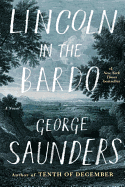
Many admirers of George Saunders's inimitable short story collections like Tenth of December probably have despaired of this supremely talented, empathetic writer ever producing a novel. But with the publication of Lincoln in the Bardo, the wait is over, and we have a story of loss and grief that's extraordinary in both substance and style. The "bardo" is, in Tibetan Buddhism, the transitional state between death and rebirth. In Saunders's novel, it has a tangible location: Oak Hill Cemetery in Washington, D.C.'s Georgetown neighborhood, February 1862, shortly after the death of Abraham Lincoln's son Willie, age 11, from typhoid fever.
Over the course of an extended evening, the novel recounts the anguished visits of the grief-stricken president to the mausoleum containing his son's body. These rendezvous occur in anything but solitude. Instead, they're intently observed by an audience of spirits, whose alternating chorus of voices supplies most of the novel's distinctive, drama-style narrative as they recognize, in the words of one of them, the "vivifying effect this visitation had on our community." And as if the premature death of his son weren't enough, the Lincoln of Saunders's novel, still in the first year of his presidency, must endure virulent attacks on his fitness for office. In stark contrast to the descriptions of the phantasmagoric events at Oak Hill are the chapters containing fragments of contemporary and historical writing about Lincoln.
George Saunders's Lincoln in the Bardo unquestionably requires a willing suspension of disbelief. Once accomplished, it's easy and most rewarding to surrender to the spellbinding power of this captivating novel. --Harvey Freedenberg, attorney and freelance reviewer

